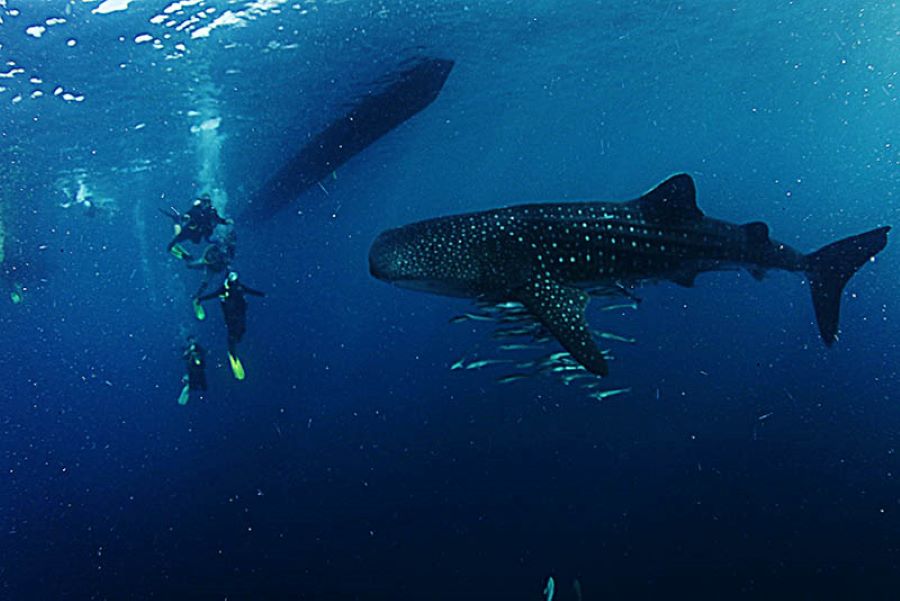There are moments in life that feel like they split you open in the best way—where fear, wonder, and humility meet all at once. Swimming with the whale sharks of Saleh Bay was one of those moments for me.
But I’ll be honest: I had no idea what I was getting into.
I watched a few videos, read a blog or two, packed my snorkel, and assumed I was ready. I wasn’t. And that’s exactly why I’m writing this—for anyone considering this once-in-a-lifetime experience, I want to tell you what I wish I had known before leaping into the deep beside Earth’s gentlest giant.
1. They Are Way Bigger Than You Expect
Yes, I read that whale sharks can grow up to 12 meters. But reading numbers and seeing one glide past you underwater are two completely different things.
The first time one of them appeared below our boat, I actually gasped out loud. From the surface, all you see is a shadow at first—huge, slow-moving, mysterious. And then suddenly, you see the head, the white speckles on dark gray skin, and that massive sweeping tail.
Swimming next to something that big? It does something to your nervous system. Not in a bad way—just a primal one. It’s humbling.
2. You Can’t Fake Calm in the Water
I thought I was pretty confident in the ocean. I’ve snorkeled a lot. But nothing prepared me for how important it is to slow down when you’re with whale sharks.
Your energy matters. If you splash too much or move too fast, they’ll simply dive deeper. They’re not aggressive, but they are sensitive to their surroundings. Staying calm, breathing slowly, and moving gently are key.
On my first try, I kicked too hard and startled the one I was closest to. I missed the chance to swim alongside it. Lesson learned.
3. You Don’t Chase Them—You Flow With Them
This was probably the biggest mental shift I had to make.
When we think “swim with,” we often imagine catching up or leading the way. With whale sharks, it’s the opposite. You let them set the pace. You observe. You match their rhythm without interrupting.
They’re not there for you. They’re just being themselves in the water they’ve known their entire lives.
That realization changes the whole tone of the experience—from something adrenaline-filled to something peaceful, meditative, almost sacred.
4. Ethical Tourism Makes All the Difference
This wasn’t just a swim. It was a lesson in respect.
I chose to go with a small, conservation-focused operator who emphasized no touching, no feeding, and no crowding the whale sharks. We were briefed about safety—for us and the animals. The whole thing felt like we were visitors in their world, not the other way around.
I’m so glad I picked an ethical operator and didn’t go with something that felt commercialized or chaotic. If you want to feel the real magic, do yourself a favor and book with someone who prioritizes the animals first.
This is the tour I joined, and I recommend it with my whole heart:
<a href=”https://whalesharksalehbay.com/”>Saleh Bay whale shark tour</a>
5. Saleh Bay Is Wild, Quiet, and Magical
I had never heard of Saleh Bay before this trip. It’s not a mainstream destination. But maybe that’s why it felt so raw and authentic.
There weren’t massive crowds or party boats. Just a few quiet travelers, traditional fishing platforms (bagan), and a backdrop of green hills and calm sea.
The whale sharks of Saleh Bay come here naturally—attracted by the lights from the fishing platforms and the abundance of plankton. There’s no baiting. No tricks. Just nature doing its thing.
If you’re dreaming of an underwater adventure that feels untouched, Saleh Bay is the real deal.
6. You Will Feel Small—In the Best Way
There was one moment, maybe 20 minutes into the swim, when I found myself completely alone with one of them. The others had drifted off in a different direction. It was just me and the whale shark, side by side.
I stopped kicking. I just floated. I could see its eye, its mouth slowly opening and closing, its whole massive body moving with grace.
I felt so small—but not in a bad way. I felt… grounded. Connected. Like I was witnessing something ancient and wise and peaceful.
It’s hard to explain unless you’ve been there. But if you’ve ever needed a reset for your spirit, this is it.
7. The Experience Stays With You
Long after I dried off and returned to land, I kept thinking about that day.
Not because I got great photos (though I did). Not because I could check something off my bucket list. But because I felt something shift in how I see the world.
The ocean feels more alive to me now. More sacred. I think about the whale shark when I close my eyes sometimes—its calm gaze, its slow tail sweep, the way it disappeared into the deep like a dream fading away.
8. You Don’t Need to Be an Expert Swimmer—But You Do Need Respect
Don’t worry if you’re not a freediver or a strong swimmer. The tour operators usually provide flotation gear, and most swims are short and manageable.
What is required is respect. Respect for the animals, the environment, and the people who live there. You’re not visiting a zoo. You’re visiting their home.
That shift in perspective will make the whole experience more meaningful.
A Few Practical Things I’m Glad I Knew (and Some I Didn’t)
- Mask fogging is real. Bring anti-fog solution or spit in your mask. Trust me.
- Sunburn sneaks up on you. Reef-safe sunscreen is your best friend.
- The best encounters happen early. Don’t be late for departure.
- You don’t need to get super close. Even 5–10 meters away, the encounter is stunning.
- Underwater cameras are awesome—but don’t let them steal your moment. Look with your eyes too.
